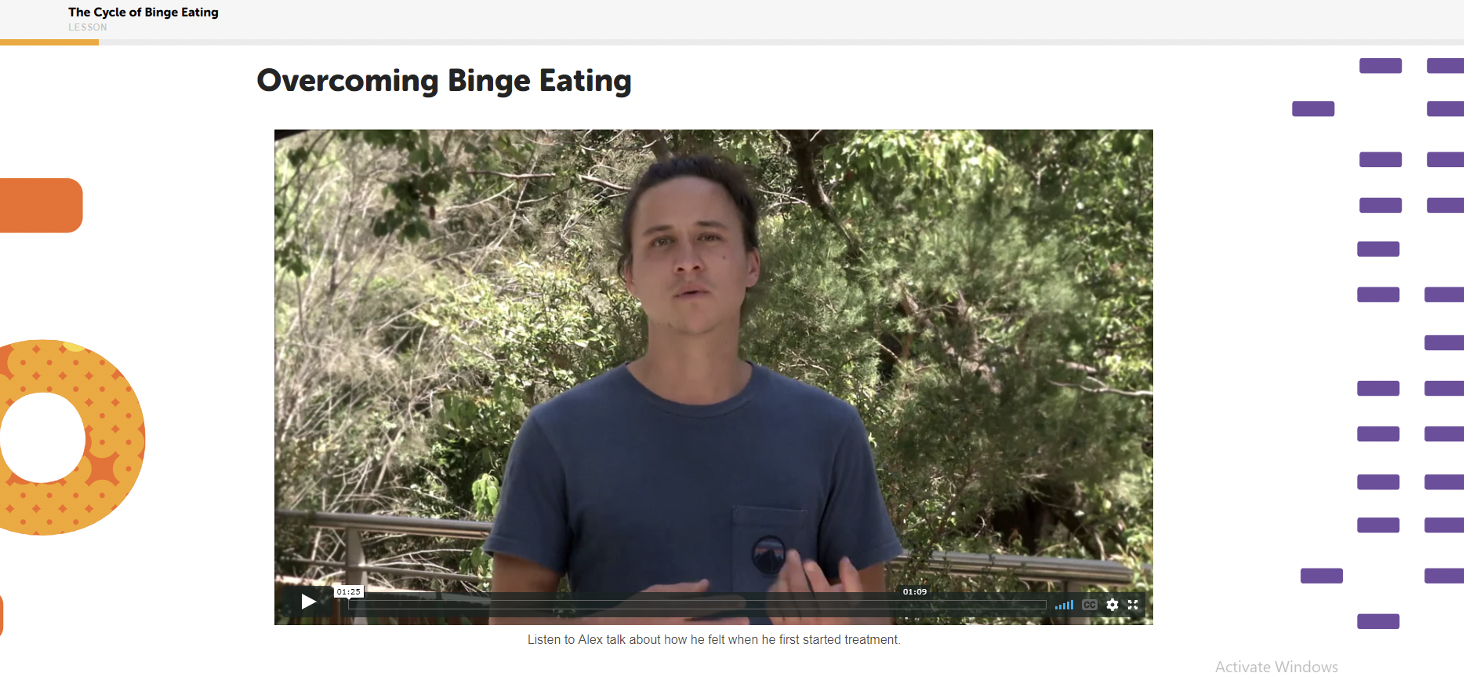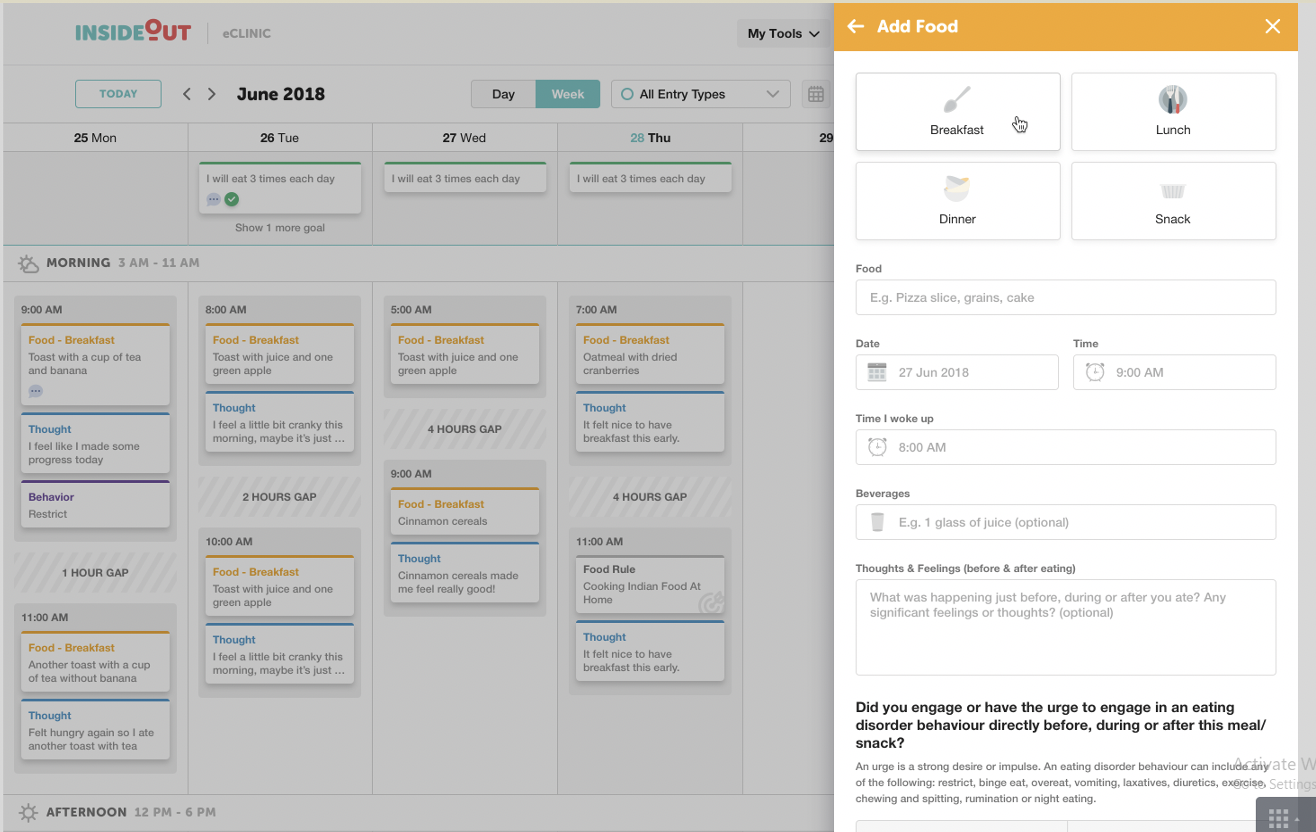InsideOut Institute’s ‘Binge Eating e-Therapy Program’ is breaking new ground in online treatment.
We caught up with InsideOut Institute and University of Sydney PhD researcher, Sarah Barakat, after her virtual presentation to the International Conference of Eating Disorders 2020.
Q: Can you tell us about your Binge Eating e-Therapy Program (BEeT)?
A: Sure. BEeT is a free online, CBT (cognitive behavioural therapy) program developed to treat any kind of binge eating difficulties – so, binge eating disorder, bulimia nervosa, or other instances of overeating.
It’s a 12-week course with 10 modules that take about an hour to complete each week. There’s a virtual therapist named Claudia, who takes people through the key CBT strategies.
For example, regular eating, thought challenging, psychoeducation, and behavioural experiments.
Q. And I heard you talk about another virtual person called Alex?

A: Yes, so Alex speaks about his experience of going through a CBT program as well. He’s there to share some support and encouragement around any challenging aspects of CBT and ways he has dealt with it.
For example, a behavioural experiment where he challenges his fears of other people seeing his body whilst going for a swim at the beach.
The other big part of the program is personal goal setting and tracking those goals, as well as understanding your own cycle of binge eating.
Q: How do you understand your own cycle of binge eating?
A: Well, we explain the different types of triggers for binge eating and then also some of the behaviours and the reinforcing effects of those behaviours.
For example, we explore the ways that food may be used as a way of numbing or avoiding intense or uncomfortable emotions.
Users are also able to track what they experienced at each stage of a binge cycle, using the program’s calendar tool.

We also teach the importance of eating regularly and trying to structure meals every few hours.
All of these skills are taught over time, so you’re not overwhelmed with too many to practice at once.
Q: What are the results of the program so far?
A: We did a pilot study a few years back with 25 users. There was a significant decrease in how often people have a binge eating episode, and the loss of control they felt while binging.
Something that I found really interesting was that while we were focusing on changing behaviours, there was actually a change in users’ attitudes as well. For example, toward eating concerns, their shape, and dietary restraint - a sort of flow on effect.
We’ve now moved onto a randomised controlled trial to test this program out further.
Q: What are your hopes for the program?
We know that within Australia, community mental health teams are really stretched and are actually at capacity – we need to intervene early. Approximately 600,000 Australians are living with bulimia nervosa and binge eating disorder - and recovery is possible for everyone.
If we intervene early, and we're getting treatment to people at an early stage, we're preventing escalation of their symptoms, and therefore, escalation of the care that's required.
Firstly, if we intervene early, and we're getting treatment to people at an early stage, we're preventing escalation of their symptoms, and therefore, escalation of the care that's required.
Secondly, because online treatments place less of a demand upon clinician time and resources, it means more time is dedicated to those with more severe presentations.
Importantly, getting professional help may not be affordable for everyone – this helps makes treatment equitable, as well as accessible in rural and remote areas.
We’re currently recruiting people who have difficulties with binge eating (aged over 16) to participate in a free 12-week trial.
For more information or to sign up to BEeT, email etherapy.trial@sydney.edu.au or visit https://beet.insideoutinstitute.org.au/** **
Check out the following fact sheets:
Getting Help Early: https://insideoutinstitute.org.au/resource-library/getting-help-early
Strategies for Regular Eating: https://insideoutinstitute.org.au/resource-library/strategies-for-regular-eating
What is Binge Eating Disorder? https://insideoutinstitute.org.au/resource-library/what-is-binge-eating-disorder

